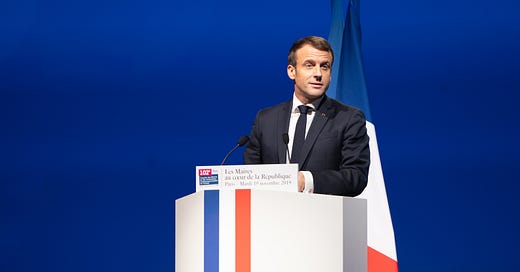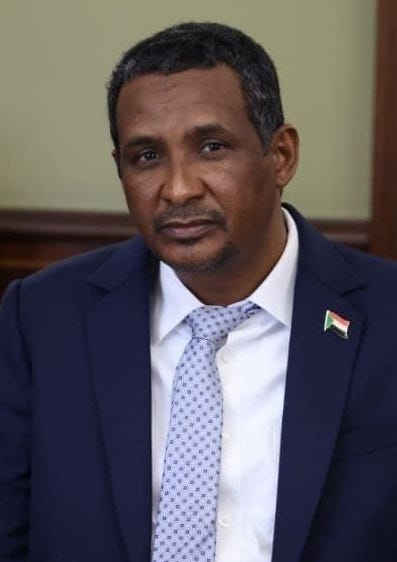🔅 Macron Calls African Leaders "Ungrateful"
Is Obesity Linked To Corruption? & US Declares Genocide, Sanctions ‘Hemedti’

Good Morning from Freetown, Sierra Leone!
Obesity and Corruption: When Leaders’ Waistlines Tell All

Here’s an odd study, and we’re wondering whether it might apply to the continent:
In post-Soviet nations, corruption might not just show up in the headlines—it could also be lurking in the mirror, quite literally. Pavlo Blavatskyy, an economics professor with a flair for the unexpected, suggests a peculiar connection: the higher the median BMI of a country’s government ministers, the more corrupt the government.
Yes, you read that right. Ministers’ waistlines might just be spilling state secrets.
A Hedonistic Hypothesis:
Blavatskyy’s “hedonistic theory of corruption” posits that luxurious banquets—the kind involving endless courses and flowing drinks—are a hallmark of corrupt governance. Over time, those indulgences leave their mark not just on government contracts but on government waistlines.
To test this theory, Blavatskyy’s team used face images of 299 government ministers from 15 post-Soviet states in 2017, employing algorithms to estimate their BMI. The results? Countries with the slimmest ministers, like Estonia and Lithuania, scored lowest on the corruption scale. Meanwhile, the rotund regimes of Turkmenistan and Uzbekistan not only tipped the BMI scales but also ranked as the most corrupt.
A Quirky Yet Flawed Measure:
Blavatskyy’s BMI metric earned him an Ig Nobel Prize in 2021—a fitting accolade for research that’s equal parts curious and comical. But it’s not without its critics. The study hinges on a specific cultural tradition: feasting as a manifestation of corruption. Outside post-Soviet borders, bribes might take the form of cash, gold, or even lavish gym memberships—less likely to inflate BMI but no less corrupt.
While we shouldn’t rush to judge a minister’s morals by their measurements, Blavatskyy’s research raises intriguing questions. Can physical traits provide insight into political cultures? And could this be applied to an African context?
African Leaders Push Back on Macron’s Remarks About "Ungrateful" Nations
Senegal and Chad have fired back at French President Emmanuel Macron after his comments suggesting that African countries in the Sahel have been ungrateful for France’s military efforts against jihadist insurgencies. Macron claimed that without French intervention, these nations would not remain sovereign—a statement that has reignited debates on neo-colonialism and France’s waning influence in West Africa.
Chad: "Learn to Respect Africa"
Chad’s Foreign Minister Abderaman Koulamallah didn’t mince words, accusing Macron of showing contempt for Africa. Speaking on national TV, Koulamallah stated that France’s attitude underscored a lack of respect for African nations and their sacrifices. "French leaders must learn to respect the African people and recognise the value of their sacrifices," he said, referencing the role of African soldiers in France’s liberation during World War II.
Koulamallah also pointed out that France's actions in Africa were often driven by its own strategic interests rather than a genuine concern for stability. Chad recently ended its 60-year defence pact with France, signaling a desire to chart its own path.
Senegal: “France Destabilized Africa”
Senegal’s Prime Minister Ousmane Sonko took aim at France’s historical role, citing its actions in Libya as a destabilizing factor for the region. Sonko rejected Macron’s assertion that France was responsible for Senegal’s sovereignty, adding that the country’s decision to close French military bases stemmed from its own independence, not negotiations with Paris.
Sonko also reminded Macron of the African soldiers who were instrumental in France’s wartime victories, some of whom were "forcibly mobilized" and poorly treated. “Without those sacrifices, France might still be German today,” he said.
A Shifting Power Dynamic
France’s influence in Africa has been steadily declining. Once viewed as a key partner in combating Islamist insurgencies, France has faced growing accusations of neo-colonialism and exploitation. This, coupled with growing anti-French sentiment, has prompted several countries—like Mali, Burkina Faso, and Niger—to sever ties and expel French troops.
And so it is not surprising that Macron’s remarks at an annual ambassadors’ conference in Paris were viewed by many African leaders as patronizing. "None of them would be a sovereign country today if the French army hadn’t deployed," Macron said, referring to the 2013 French intervention in Mali to curb jihadist insurgencies.
The comment, laced with sarcasm—“I think someone forgot to say thank you”—did little to smooth relations. Critics argued that Macron ignored the broader context of France’s involvement, which many perceive as serving its own geopolitical and economic interests rather than altruism.
Sudan’s RSF in Hot Water: US Declares Genocide, Sanctions ‘Hemedti’
The Short Version
Who: Sudan’s Rapid Support Forces (RSF) and its leader, Mohamed “Hemedti” Hamdan Dagalo
What: The U.S. government has determined members of the RSF and allied militias committed genocide in Sudan—and slapped travel bans and asset freezes on Hemedti (plus sanctions on seven UAE-based RSF-linked companies).
Why it matters: This conflict has killed tens of thousands, displaced millions, and the RSF’s attempts to paint itself as a benign “new government in waiting” just took a serious PR hit.
The Background
Sudan’s been in a downward spiral since April 2023, when a power struggle between the country’s army and the RSF exploded into full-blown war. They took up arms, leaving half the population facing hunger and pushing the region into a humanitarian nightmare. The RSF and its allied militias have been accused of systematically targeting certain ethnic groups—murdering men and boys, raping women and girls.
A Genocide Determination and Sanctions
Genocide Label: U.S. Secretary of State Antony Blinken said the RSF systematically carried out ethnic killings and sexual violence. Calling it “genocide” is big—it’s a legal and moral line in the sand.
Sanctions, Big Time: Hemedti now has his U.S. assets frozen (if any exist), and he’s barred from stepping on American soil.
Seven Companies in the UAE: Part of the RSF’s financial empire—linked to gold, banking, weapons procurement—also got sanctioned, which complicates their money flows and squeezes the RSF’s war machine.
But the RSF is not having it, equating the U.S. stance to when Nelson Mandela was once sanctioned—basically telling Washington: “You’re punishing the wrong guys.”
Food for Thought
“Education has no end.”
— Tanzania Proverb





